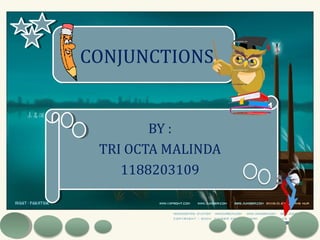Zz
- 1. CONJUNCTIONS BY : TRI OCTA MALINDA 1188203109
- 2. Conjunction ? conjunction is a part of speech that connects two words, sentences, phrases or clauses together.
- 3. Are used to link or join two words or phrases that are equally important and complete in terms of grammar when compared with each other. ( FANBOYS ) For And Nor But Or Yet So Coordinating c O N J U N C T I O N
- 4. Example :  On Friday night we watched TV and a movie.  We went to the park, but we did not have time for the museum.  Let's meet at the beach or in front of the hotel.
- 5. Subordinating Conjunctions after although as because before how if once since than that though Till until when where whether while Subordinating conjunctions join an independent clause and a dependent clause.
- 6. • They went running (independent clause), although it was very hot (dependent clause). • We decided to take a couple of French classes this summer (independent clause), since we could not go away on vacation (dependent clause). E X A M P L E S
- 7. Correlative Conjunctions Correlative conjunctions come in pairs. The word correlative (adjective) means a similar relationship of some kind. both / and not only / but also either / or neither / nor whether / or
- 8. Examples • Jason not only speaks Chinese, but also Japanese and Korean. • You can have either pie or a cake.
- 9. Most people agree that some form of family limitation or spacing is desirable for the good of the family and society. But individuals and groups–especially religious groups–differ sharply on the methods of birth control that they consider moral and acceptable. PARAGRAPH
- 10. Most people agree that some form of family limitation or spacing is desirable for the good of the family and society. But individuals and groups–especially religious groups–differ sharply on the methods of birth control that they consider moral and acceptable. PARAGRAPH










